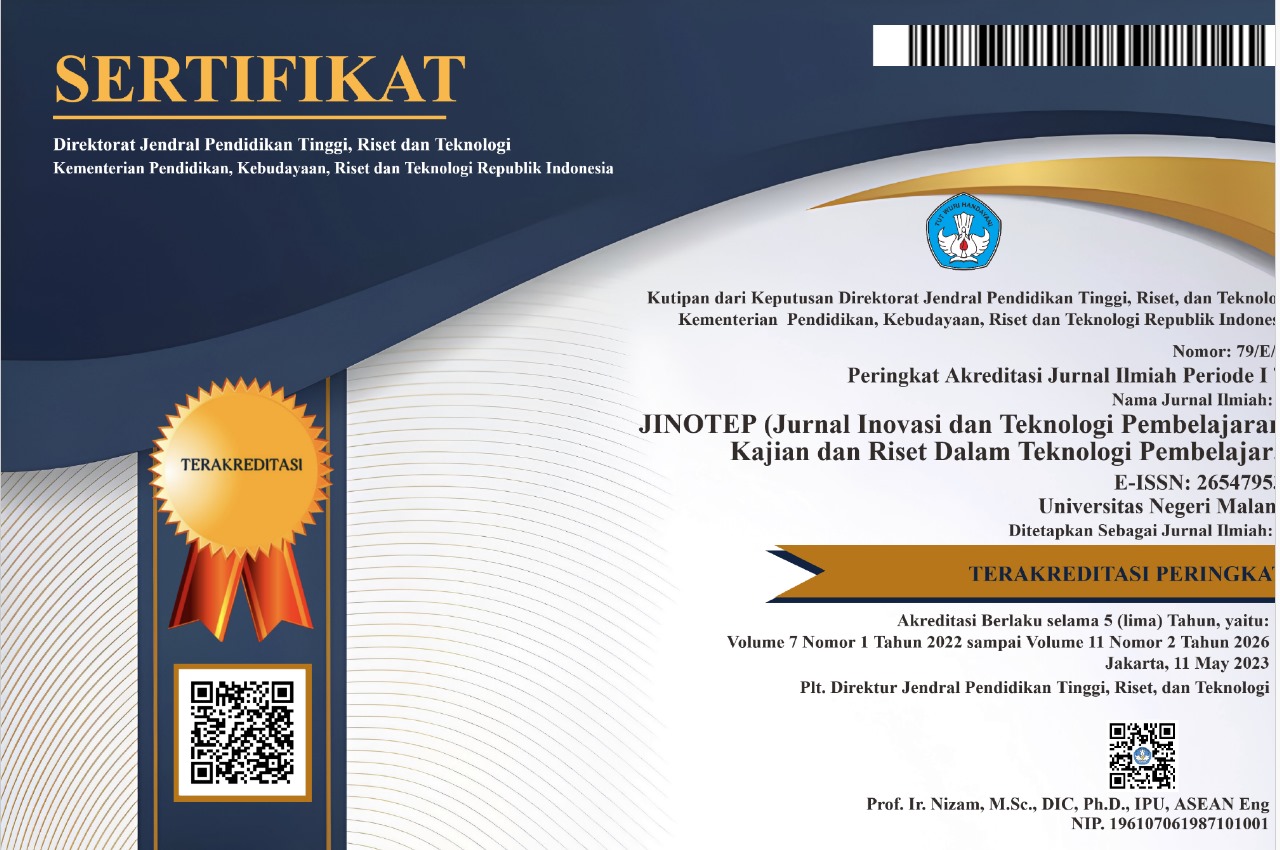Developing M-Learning Applications to Support Digital Literacy of Vocational High School Students
Abstract
Abstrak: Literasi digital sangat penting untuk diterapkan saat ini karena pembelajaran telah mengarah pada pembelajaran yang mendukung teknologi. Literasi digital di Indonesia masih tergolong sangat rendah sehingga perlu upaya dalam meningkatkannya. Penelitian ini bertujuan untuk mengembangkan aplikasi m-learning berbasis Android yang tepat untuk mendukung literasi digital siswa SMK. Jenis metode yang digunakan yakni penelitian dan pengembangan (R&D) dengan model ADDIE. Hasil penelitian ini menunjukkan bahwa pengembangan media sudah sesuai dengan kriteria baik materi maupun media yang menunjukkan hasil 3,67 yang kategori “baik”, sementara hasil pada uji media sebesar 4,05 yang kategori “sangat baik” dan pada uji coba kelas 3,92 yang kategorinya “baik”. Aplikasi ini juga, terbukti efektif untuk digunakan dalam mendukung literasi digital siswa yang ditandai dengan meningkatnya hasil belajar siswa dari rata-rata pretest 66 menjadi 78 pada postestnya. Sehingga dapat disimpulkan dari hasil penelitian ini memberikan kontribusi dalam mendukung literasi digital peserta didik vokasi.
Abstract: Digital literacy is very important to apply at this time because learning has led to learning that supports technology. Digital literacy in Indonesia is still very low, so efforts are needed to increase it. This study aims to develop appropriate Android-based m-learning applications to support digital literacy in vocational high school students. The type of method used is research and development (R&D) with the ADDIE model. The results of this study indicate that media development is in accordance with the criteria for both material and media which shows a result of 3.67 which is in the "good" category, while the results in the media test are 4.05 which is in the "very good" category and in class trials 3.92 in the "good" category. This application has also proven to be effective for use in supporting students' digital literacy which is marked by increased student learning outcomes from an average pretest of 66 to 78 in the posttest. So it can be concluded from the results of this study that it contributes to supporting the digital literacy of vocational students.
Keywords
Full Text:
PDFReferences
APJII. (2019). Laporan survei penetrasi & profil perilaku pengguna internet indonesia 2018 (Penetration Survey Report & Indonesian Internet User Behavior Profile 2018.
Ardiansyah, A. A., & Nana, N. (2020). Peran mobile learning sebagai inovasi dalam meningkatkan hasil belajar siswa pada pembelajaran di sekolah. Indonesian Journal Of Educational Research and Review, 3(1), 47-56. https://doi.org/10.23887/ijerr.v3i1.24245
Asrizal, A., Amran, A., Ananda, A., Festiyed, F., & Sumarmin, R. (2018). The development of integrated science instructional materials to improve students’ digital literacy in scientific approach. Jurnal Pendidikan IPA Indonesia, 7(4), 442–450. https://doi.org/10.15294/jpii.v7i4.13613
Berawi, M. A. (2017). Stimulating innovation and creativity: The way forward. International Journal of Technology, 8(1), 1. https://doi.org/10.14716/ijtech.v8i1.7628
Churchill, N. (2020). Development of students’ digital literacy skills through digital storytelling with mobile devices. Educational Media International, 57(3), 271–284. https://doi.org/10.1080/09523987.2020.1833680
Ejemeyovwi, J. O., Osabuohien, E. S., Johnson, O. D., & Bowale, E. I. K. (2019). Internet usage, innovation and human development nexus in Africa: the case of ECOWAS. Journal of Economic Structures, 8(1). https://doi.org/10.1186/s40008-019-0146-2
Firdaus, F., Suherman, S., & Fadlullah, F. (2022). Pengembangan aplikasi pembelajaran berbasis android dalam pembelajaran kontekstual materi kegiatan ekonomi di sekolah dasar. Edukatif : Jurnal Ilmu Pendidikan, 4(4), 5176–5185. https://doi.org/10.31004/edukatif.v4i4.3160
Gilster, P., (1997). Digital literacy (p. 1). New York: Wiley Computer Pub..
Haq, M. S., Samani, M., Karwanto, & Hariyati, N. (2022). Android-based digital library application development. International Journal of Interactive Mobile Technologies, 16(11), 224–237. https://doi.org/10.3991/ijim.v16i11.32055
Hatlevik, O. E., Ottestad, G., & Throndsen, I. (2015). Predictors of digital competence in 7th grade: a multilevel analysis. Journal of Computer Assisted Learning, 31(3), 220–231. https://doi.org/10.1111/jcal.12065
Kementrian Komunikasi dan Informasi. (2020). Status Literasi Digital Indonesia.
Kustandi, C., & Bambang, S. (2016). Media Pembelajaran. Ghalia Indonesia .
Liansari, V., & Nuroh, E. Z. (2018). Realitas penerapan literasi digital bagi mahasiswa FKIP Universitas Muhammadiyah Sidoarjo. Proceedings of The ICECRS, 1(3). https://doi.org/10.21070/picecrs.v1i3.1397
Ljungkvist, P., & Mozelius, P. (2012). Educational games for self learning in introductory programming courses-a straightforward design approach with progression mechanisms. In Proceedings Of The 6th European Conference On Games Based Learning, ECGBL (pp. 285-293). https://www.researchgate.net/publication/261510248
Nikou, S., & Aavakare, M. (2021). An assessment of the interplay between literacy and digital Technology in Higher Education. Education and Information Technologies, 26(4), 3893–3915. https://doi.org/10.1007/s10639-021-10451-0
Nipo, D. T., Lily, J., Idris, S., Pinjaman, S., & Bujang, I. (2020). Human development through the lens of digital literacy. Business and Economic Research, 10(3), 203. https://doi.org/10.5296/ber.v10i3.17183
Patmanthara, S., & Hidayat, W. N. (2018). Improving vocational high school students digital literacy skill through blended learning model. Journal of Physics: Conference Series, 1028(1). https://doi.org/10.1088/1742-6596/1028/1/012076
Sadiman, Arief, H., Haryono, A., & Raharjo, R. (2012). Media Pendidikan: Pengertian, Pengembangan dan Pemanfaatannya. PT. Raja Grafindo Persada.
Sujana, A., & Rachmatin, D. (2019). Literasi digital abad 21 bagi mahasiswa PGSD: apa, mengapa, dan bagaimana. In Current Research in Education: Conference Series Journal (Vol. 1, No. 1, pp. 003-013).
Sukmadinata, & Nana, S. (2009). Metode Penelitian Pendidikan. Remaja Rosdakarya.
Suwartha, N., Ardiyansyah, Berawi, M. A., Surjandari, I., Zagloel, T. Y. M., Atmodiwirjo, P., & Atmo, Y. A. (2017). Science, technology and innovation for sustainable world. International Journal of Technology, 8(6), 979–982. https://doi.org/10.14716/ijtech.v8i6.1151
Talan, T. (2020). The effect of mobile learning on learning performance: A meta-analysis study. In Educational Sciences: Theory and Practice (Vol. 20, Issue 1, pp. 79–103). Edam. https://doi.org/10.12738/jestp.2020.1.006
Wheeler, S. (2012). Digital literacies for engagement in emerging online cultures. In eLC Research Paper Series (Vol. 5). http://elcrps.uoc.edu
Zhang, Y., & Zuo, L. (2019). College English teaching status and individualized teaching design in the context of mobile learning. International Journal of Emerging Technologies in Learning, 14(12), 85–96. https://doi.org/10.3991/ijet.v14i12.10704
Zua, B. (2021). Literacy: Gateway to a World of Exploits. International Journal of Education and Literacy Studies, 9(1), 96. https://doi.org/10.7575/aiac.ijels.v.9n.1p.96
DOI: http://dx.doi.org/10.17977/um031v9i32022p291
Refbacks
- There are currently no refbacks.
Copyright (c) 2022 Ary Purmadi, Muzakkir, Endah Resnandari Puji Astuti

This work is licensed under a Creative Commons Attribution-ShareAlike 4.0 International License.
======================================================================
Jurnal Inovasi dan Teknologi Pembelajaran published by Universitas Negeri Malang in collaboration with the Asosiasi Program Studi Teknologi Pendidikan Indonesia (APS TPI) and Ikatan Profesi Teknologi Pendidikan Indonesia (IPTPI) with a MoU.
Publisher Address:
Educational Technology Laboratorium, Building D5, 1st Floor
Faculty of Education, Universitas Negeri Malang
Semarang St. No. 5, Malang City, East Java Province, Postal Code 65145
Email: jinotep.fip@um.ac.id
======================================================================

JINOTEP is licensed under a Creative Commons Attribution-ShareAlike 4.0 International License.
JINOTEP Statistics (Since July 13th, 2020)



.png)




.png)
1.png)
1.png)
4.png)
2.png)
1.png)
1.png)
.png)


_3.png)





1.png)
.png)